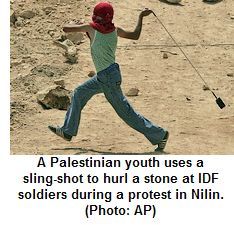 The Economist‘s print edition features the effects of Israel’s security barrier on the residents of the West Bank village of Nilin (also known as Naalin).
The Economist‘s print edition features the effects of Israel’s security barrier on the residents of the West Bank village of Nilin (also known as Naalin).
According to The Economist:
Every week, protesting villagers and campaigners from outside walk towards the confiscated land and shout at the Israelis. The demonstrations are usually peaceful, but occasionally a protester throws a stone. The Israeli soldiers respond with rubber-coated bullets and tear-gas.
Despite this image of relative calm disrupted by trigger-happy Israeli soldiers, the reality is quite different. Israeli soldiers have regularly come under attack from protestors at Nilin. For example, YNet News reported on 28 August:
Four Border Guard officers were lightly wounded from rocks thrown at them during a violent riot. Two of those wounded were taken to a Jerusalem hospital for medical attention and two others were treated at the scene
During the altercation, a Border Guard officer fired warning shots in midair, after identifying a masked man amongst the crowd, attempting to light a Molotov cocktail.
A week earlier on 21 August, YNet News also reported from Nilin:
Some 150 Palestinians and left-wing activists are currently staging a protest there against the construction of the security fence, and are hurling rocks towards Border Police troops that are securing the site….
Last week an Israeli photographer and two Border Guard officers were wounded in yet another day of clashes in Naalin from rocks thrown at them by demonstrators.
The protests at Nilin and elsewhere regularly descend into violence, provoked by demonstrators eager to grandstand for the cameras of the international media.
The Economist also fails to adequately explain the need for Israel’s security barrier or its effectiveness at preventing the terror that claimed the lives of hundreds of Israeli civilians over the past few years. The Economist actually downplays the terror, failing to do justice to the horrific situation that Israel found itself in:
The Israelis began building the barrier during the second intifada (uprising) that started in 2000, when Palestinian suicide-bombers would sneak into Israel and blow themselves up, often in the midst of civilians.
Employing the Palestinian narrative, The Economist states that two Israeli settlements are located on “Palestinian land.” The article also, in a blanket statement, claims that “in international law, all settlement building on the West Bank is illegal.”
As Jeffrey Helmreich writes for the JCPA, one may legitimately support or challenge Israeli settlements in the disputed territories, but they are not illegal. International law is not as clear-cut as The Economist suggests and it is intellectually dishonest not to point out that there are varying interpretations as to the legality or otherwise of Israeli settlements or the status of the West Bank.
Please write to The Economist, highlighting the deficiencies and distorted information in this article – [email protected]
GUARDIAN FINALLY ISSUES CORRECTION
 HonestReporting UK and its international site repeatedly encouraged subscribers to write to The Guardian to issue a correction to its obituary for Palestinian poet Mahmoud Darwish. Nearly a month later, a correction has finally been published:
HonestReporting UK and its international site repeatedly encouraged subscribers to write to The Guardian to issue a correction to its obituary for Palestinian poet Mahmoud Darwish. Nearly a month later, a correction has finally been published:
Israeli Arabs lived under military rule from 1948 to 1966, not until 1986 as we said in the obituary of Mahmoud Darwish (page 30, August 11).
While this example may not appear to be a big development, it is important as a matter of principle that media outlets issue corrections after publishing factual errors. In this case, your e-mails to The Guardian have achieved this goal.

